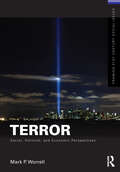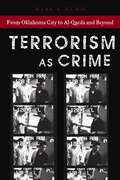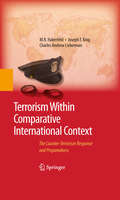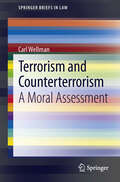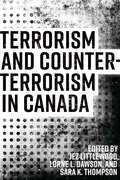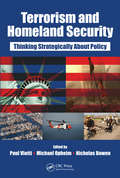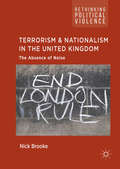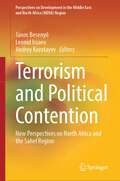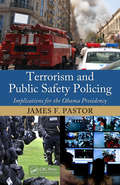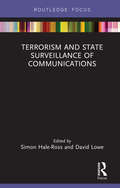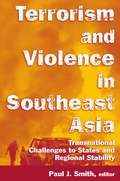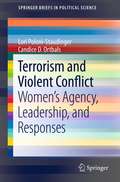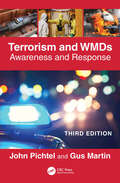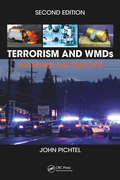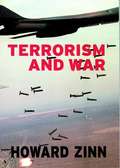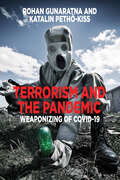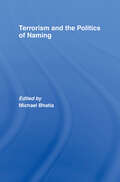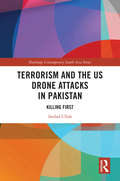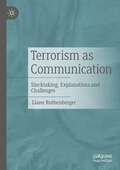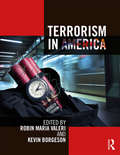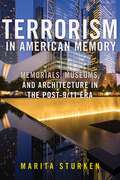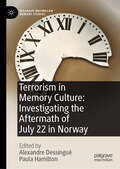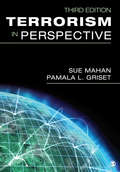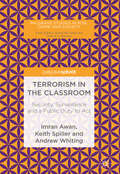- Table View
- List View
Terror: Social, Political, and Economic Perspectives (Framing 21st Century Social Issues)
by Mark WorrellAbout the Series The goal of this new, unique Series is to offer readable, teachable "thinking frames" on today’s social problems and social issues by leading scholars, all in short 60-page-or-shorter formats, and available for view on http://routledge.customgateway.com/routledge-social-issues.html. For instructors teaching a wide range of courses in the social sciences, the Routledge Social Issues Collection now offers the best of both worlds: originally written short texts that provide "overviews" to important social issues as well as teachable excerpts from larger works previously published by Routledge and other presses. About the Book In this short text, Worrell shines a unique, unorthodox light on ‘Terror’ from the standpoint of critical social theory. He explains how the social, political and economic effects of terrorism fit into the dynamics and structures of the modern world as a whole.
Terrorism As Crime: From Oklahoma City to Al-Qaeda and Beyond (Alternative Criminology #7)
by Mark S HammCar bombing, suicide bombing, abduction, smuggling, homicide, and hijacking are all profoundly criminal acts. In Terrorism as Crime Mark S. Hamm presents an understanding of terrorism from a criminological point of view, arguing that the most successful way to understand, detect, prosecute and deter these acts is to use conventional criminal investigation methods. Whether in Oklahoma City or London, Terrorism as Crime demonstrates that criminal activity is the lifeblood of terrorist groups and that there are simple common denominators at work that can remove the mystery surrounding many of these terrorist groups. Once understood the vulnerabilities of these organizations can be exposed.This important volume focuses in on six case studies of crimes committed by jihad and domestic right wing groups, including biographies of more than two dozen terrorists along with descriptions of their organizations, strategies, and terrorist plots. Terrorism as Crime offers an original and significant framework for explaining international and domestic terrorism, as well as how future acts might be detected or exposed.
Terrorism Within Comparative International Context
by Joseph F. King Charles A. Lieberman M. R. HaberfeldThe post-9/11 era, with its emphasis on preparedness against terrorist attacks, has seen an ongoing conflict of priorities between law enforcement agencies and the civilian sector: public safety versus individual rights. Community-oriented policing--mobilizing community support in partnership with local law enforcement--has been developed internationally to address this issue, and Terrorism within Comparative International Context assesses the progress and shortcomings of community-based programs. Written by leading experts in police science and based on extensive interviews and focus groups with law enforcement, media, and community representatives, the book offers: A comparative database on terror control strategies in, among others, Ireland, Turkey, Sweden, Spain, the United Kingdom and the Netherlands Analysis of the interaction between the community and local law enforcement in response to terrorist activities. Insights into the relationships between home-grown terrorists, the preventive role of the community, and the proactive role of local law enforcement. A "Best Practices" section including recommendations for investigation and interrogation techniques. A real-world template for training law enforcement personnel. Terrorism within Comparative International Context is critical reading for researchers, students and professionals across a range of interrelated fields, including criminal justice, terrorism/counterterrorism, organized crime, police science, and public administration, and makes an up-to-date textbook for courses in these areas.
Terrorism and Counterterrorism
by Carl WellmanThis book presents a definition of terrorism that is broad and descriptive and much needed to prevent misunderstanding. The book identifies the features that make terrorism 'wrong', including coerciveness, the violation of rights and undermining of trust. Next, it evaluates reasons given for terrorism such as the protection of human rights and the liberation of oppressed groups as not normally justified. Following this, the book identifies and evaluates international responses to terrorism, taking into account General Assembly and Security Council resolutions, United Nations conventions and criminalization in international law. It also looks at national responses which often take the shape of surveillance, detention, interrogation, trials, targeted killings, intrusion and invasion. Finally, the book discusses how, if at all, the moral norms of personal morality apply to the actions of nation states.
Terrorism and Counterterrorism in Canada (Canada Among Nations)
by Littlewood JezThrough close analysis of the Canadian context, Terrorism and Counterterrorism in Canada provides an advanced introduction to the challenges and social consequences presented by terrorism today. Featuring contributions from both established and emerging scholars, it tackles key issues within this fraught area and does so from multiple disciplinary perspectives, using historical, quantitative, and qualitative lenses of analyses to reach novel and much-needed insights. Throughout the volume, the editors and contributors cover topics such as the foreign fighter problem, far-right extremism, the role of the internet in fostering global violence, and the media’s role in framing the discourse on terrorism in Canada. Also included are essays that look at the struggles to develop specific counter-terrorism policies and practices in the face of these threats. In addition to offering a detailed primer for scholars, policymakers, and concerned citizens, Terrorism and Counterterrorism in Canada confronts the social and legal consequences of mounting securitization for marginalized communities.
Terrorism and Homeland Security: Thinking Strategically About Policy
by Paul R. Viotti Nicholas Bowen Michael A. OpheimDespite the fact that the Department of Homeland Security (DHS) has been active since November of 2002, the American homeland is still not secure from terrorist attack. What passes as DHS strategy is often just a list of objectives with vague references to the garnering of national resources, and the marshalling of support from other nations. Drawi
Terrorism and Nationalism in the United Kingdom: The Absence Of Noise (Rethinking Political Violence Ser.)
by Nick BrookeThis book makes a timely contribution to the analysis of nationalism and terrorism, and also the absence of terrorism. It proposes to analyse why Scottish, Welsh and English nationalism has never had as significant a turn to political violence as the case of Irish nationalism has. This will answer a question which is too rarely asked ‘why do certain groups not turn to terrorism?’ Nick Brooke makes an important contribution to debates on nationalism in the United Kingdom, as well as to debates on the relationship between nationalism and terrorism. Furthermore, the text provides complete narrative accounts of nationalist terrorism in Scotland, Wales and England, and considers how recent political developments impact the likelihood of further nationalist terrorism.
Terrorism and Organized Hate Crime: Intelligence Gathering, Analysis and Investigations, Fourth Edition
by Michael R. RonczkowskiThe ability of law enforcement agencies to manage and act upon intelligence is the key to countering terrorism. Likewise, a critical foundation of intelligence-led policing is the proper analysis of all information gained. Terrorism and Organized Hate Crime: Intelligence Gathering, Analysis, and Investigations, Fourth Edition demonstrates how to recognize the indicators of an impending act of terrorism or mass violence, how to deter an attack, and how to transform information into intelligence to meet community demands for safety and security. The Fourth Edition has been completely updated and expanded to cover numerous topics facing those tasked with investigating and thwarting terrorism and the terrorist acts throughout the world today. Many investigators have sought to understand the growth of the radical extremist and terrorist organization ranks. The Fourth Edition dedicates an expanded new chapter to the concerns and processes centering on radicalization and recruitment. This new chapter covers such in-depth topics like: criminal roots, gang connection, conversion, causes of extremism, models of recruitment and radicalization including self-radicalization, recruiting in the digital age, social media, youth targeting, prison radicalization and recruitment, legal concerns, case studies and groups, as well as what can be done to prevent recruitment. In addition to the new chapter, there is a new guide to sources of information for investigators and expanded discussion on IRA tactics and ISIS. Using techniques applicable to the private and the public sector, the book combines academic, research, and practitioner perspectives to establish a protocol for effectively gathering, analyzing, investigating, and disseminating criminal intelligence. Additional overage includes the role of fusion centers, terrorism financing, the handling of classified materials, the National Suspicious Activity Reporting (SAR) Initiative as well as pre-incident indicators and behavioral traits associated with terrorism. A one-stop resource for the homeland security, intelligence analyst, and investigative professional, the book arms those tasked with protecting the public with a solid blueprint for combating and investigating crimes associated with terrorism and hate. Also widely used as a core text, Terrorism and Organized Hate Crime, Fourth Edition teaches practical applications to those students enrolled in such courses as Terrorism and Hate Crimes, Violence and Terrorism, Domestic Terrorism, Terrorism and Political Violence, and Terrorism and Homeland Security. Accompanying PowerPointTm slides and a Test Bank are available to professors upon qualifying course adoption.
Terrorism and Political Contention: New Perspectives on North Africa and the Sahel Region (Perspectives on Development in the Middle East and North Africa (MENA) Region)
by Andrey Korotayev Leonid Issaev János BesenyőAgainst the backdrop of terrorist activity and the emergence of new conflicts in the MENA region, this book identifies factors of political contestation and analyzes organizational forms and dynamics of terrorism and conflict in North Africa and the Sahel. Written by an international selection of authors from different fields, the book covers topics such as the radicalization of terrorist organizations operating in the region, the financing of terrorism, the role of migration, the radicalization of women, the influence and motives of great powers and external factors such as France in the region, and the impact of the war in Ukraine. The book appeals to scholars and students of politics and international relations as well as African and Middle Eastern studies.
Terrorism and Public Safety Policing: Implications for the Obama Presidency
by James F. PastorThe trends, data, and battle-tested logic don't lie. A perfect storm of extremist ideologies is on the horizon that threatens to challenge the current state of public safety forcing police chiefs, public administrators, and security professionals to rethink their approach to policing the streets of America. Professor James Pastor, a recognized auth
Terrorism and State Surveillance of Communications
by David Lowe Simon Hale-RossThis book brings together leading counterterrorism experts, from academia and practice, to form an interdisciplinary assessment of the terrorist threat facing the United Kingdom and the European Union, focusing on how terrorists and terrorist organisations communicate in the digital age. Perspectives drawn from criminological, legalistic, and political sciences, allow the book to highlight the problems faced by the state and law enforcement agencies in monitoring, accessing, and gathering intelligence from the terrorist use of electronic communications, and how such powers are used proportionately and balanced with human rights law. The book will be a valuable resource for scholars and students of terrorism and security, policing and human rights. With contributions from the fields of both academia and practice, it will also be of interest to professionals and practitioners working in the areas of criminal law, human rights and terrorism.
Terrorism and Violence in Southeast Asia: Transnational Challenges to States and Regional Stability
by Paul J. SmithThis timely work examines the scale and root causes of terrorism across Southeast Asia, including the role of al-Qaeda's ascendancy in the region. It begins with an overview of the analytical and theoretical framework for discussing the subject. Individual chapters then examine terrorist activities from both functional and country-specific perspectives. The book traces fundamental linkages between terrorism and security issues, such as illegal immigration, narcotics trafficking, and other criminal activity. In addition, it considers the issue of convergence - the growing connection between criminal groups and terrorism, and how this may facilitate future violence. Written by a range of experts in the field, the individual chapters reflect a variety of perspectives. The contributions fall into two broad categories - chapters that directly address terrorism (the groups, their ideologies, their modus operandi, their origins, and state responses to them); and chapters that address the "enabling environment" that exists in Southeast Asia (the role of transnational crime, porous borders, convergence between terrorism and crime).
Terrorism and Violent Conflict
by Lori Poloni-Staudinger Candice D. OrtbalsThis book explores how gender intersects with political violence, and particularly terrorism. We ask how gender relations and understandings of femininity and masculinity influence political violence, which includes politics related to terrorism, state terrorism, and genocide. We investigate how women cope with and influence the politics of terrorism and genocide. The book's goals are descriptive and analytical. We (1) describe in what ways women are present (and/or perceived as absent) in political contexts involving violence, and (2) analyze what gender assumptions, identities, and frames women face and themselves express and act upon regarding political violence encountered in their lives. The manuscript is divided into seven chapters: introduction, women as victims/survivors of violence, women as perpetrators of violence, women in social movements responding to violence, women politicians leading policy regarding violence, the public opinion of women and men concerning violence, and a conclusion. Each chapter explores the intersection between gender and terrorism through the lens of the chapter focus.
Terrorism and WMDs: Awareness and Response
by John Pichtel Gus MartinTerrorism and WMDs: Awareness and Response, Third Edition is fully updated to include the latest technology and tactics surrounding the threats posed by terrorist groups—detailing plausible contexts in which chemical, biological, radiological, nuclear, and explosive (CBRNE) weapons could be used by such actors.Experienced author Gus Martin has collaborated on updating this resource, with two new chapters at the start of the book outlining the historical origins of terrorism, terrorist typologies, and the evolution of the modern terrorist environment including large-scale regional conflicts and domestic violent extremism in the United States. Additional coverage of new case studies have been added throughout. This includes an examination of the Pulse Nightclub shooting, the January 6, 2021, assault on the U.S. Capitol, the October 7, 2023 Hamas attack on Israel, and additional events that have occurred since the last edition’s release. Domestic U.S. threats—from hate, extremist, and supremacist groups—are discussed, as well as emergent and novel tactics being used in the Israel-Gaza conflict and the 2022 Russian invasion and subsequent Russia-Ukraine conflict are examined.This includes the use of drone attacks by both Ukraine and Russia and Russia’s occupation and bombardment of the Zaporizhzhia nuclear power plant (ZNPP), highlighting what could be argued are terror-like tactics that challenge the precepts of accepted international law. In the Middle East, Israel’s response in the wake of the October 7, 2023 attack by Islamist terrorists—with its subsequent operations in Gaza and an unprecedented operation involving exploding pagers and communications radios in Lebanon and Syria—evoked international criticism and controversy.Coverage also focuses on the chemistry and biology of weapons of mass destruction and, the development and history of their use, as well as the human health effects of such weapons. Added references, chapter questions—and the addition of recent terrorist acts to relevant sections—all present the modern threat environment and realistic WMD material access and attack capabilities. Given that terrorist weapons and delivery methods are becoming increasingly sophisticated, the book provides a comprehensive, current survey of terrorism and weapons of mass destruction.As such, Terrorism and WMDs, Third Edition continues to serve as an invaluable resource to students and professionals studying and working in the fields of terrorism, Homeland Security, and emergency response.
Terrorism and WMDs: Awareness and Response, Second Edition
by John PichtelTerrorism and WMD’s, Second Edition provides a comprehensive, up-to-date survey of terrorism and weapons of mass destruction (WMDs). Terrorist weapons and delivery methods are becoming increasingly sophisticated; as such, this book focuses on the chemistry and biology of WMDs, the development and history of their use, and human health effects of such weapons. Coverage of new threats, additional case studies, and the emergence of ISIL—and other terrorist actors—have been added to the new edition which will serve as an invaluable resources to students and professionals studying and working in the fields of terrorism, Homeland Security, and emergency response.
Terrorism and War (Open Media Series)
by Howard Zinn Anthony ArnoveTruth--as Zinn shows us in the interviews that make up Terrorism and War--has indeed been the first casualty of war, starting from the beginnings of American empire in the Spanish-American War. But war has many other casualties, he argues, including civil liberties on the home front and human rights abroad. In Terrorism and War, Zinn explores the growth of the American empire, as well as the long tradition of resistance in this country to U.S. militarism, from Eugene Debs and the Socialist Party during World War One to the opponents of U.S. military intervention in Afghanistan today.
Terrorism and the Pandemic: Weaponizing of COVID-19
by Rohan Gunaratna Katalin Petho-KissThe global pandemic has offered extraordinary opportunities for extremists and terrorists to mobilize themselves and revive as more powerful actors in the security landscape. But could these threat groups actually capitalize on the coronavirus crisis and advance their malevolent agendas? Utilizing the largest COVID-19-related terrorism database, the book presents an analysis built upon a quantitative and qualitative comparison between the nature of both the radical Islamist and the far-right-related threat in 2018 and 2020. It provides, for the first time, a true picture of novel trends since the pandemic outbreak.
Terrorism and the Politics of Naming (ISSN)
by Michael BhatiaPreviously published as a special issue of Third World Quarterly, this volume assesses the nature, power, role and function of names in global politics and the international media.Names are not objective, they accrue subjective associations, for example 'Terrorist' has a very different connotation to 'Freedom-fighter'. The contributors seek the truth beneath the names assigned in an effort to remove the obscurity created by the power of 'the politics of naming' to the reality of the situation, taking examples from Al Qaeda, Russia's demonization of the Chechens and naming in the Israeli-Palestine conflict, among other important contemporary debates. Terrorism and the Politics of Naming makes a substantial contribution towards elucidating the power of naming in the discourse of conflict and will be of great interest to students and scholars of political philosophy, political theory, and politics and the media.
Terrorism and the US Drone Attacks in Pakistan: Killing First (Routledge Contemporary South Asia Series)
by Imdad UllahThis book analyses the US drone attacks against terrorists in Pakistan to assess whether the ‘pre-emptive’ use of combat drones to kill terrorists is ever legally justified. Exploring the doctrinal discourse of pre-emption vis-à-vis the US drone attacks against terrorists in Pakistan, the book shows that the debate surrounding this discourse encapsulates crucial tensions between the permission and limits of the right of self-defence. Drawing from the long history of God-given and man-made laws of war, this book employs positivism as a legal frame to explore and explain the doctrine of pre-emption and analyses the doctrine of the state’s rights to self-defence as it stretches into pre-emptive or preventive use of force. The book investigates why the US chose the recourse to pre-emption through the use of combat drones in the ‘war on terror’ and whether there is a potential future for the pre-emption of terrorism through combat drones. The author argues that the policy to ‘kill first’ is easy to adopt; however, any disregard for the web of legal requirements surrounding the policy has the potential to undercut the legal claims of an armed act. The book enables the framing and analysis of such controversies in legal terms as opposed to a choice between law and policy. An examination of the legal dilemma concerning drone warfare, this book will be of interest to academics in the fields of international relations, Asian politics, South Asian studies, and security studies, in particular, global security law, new wars, and emerging technologies of warfare.
Terrorism as Communication: Stocktaking, Explanations and Challenges
by Liane RothenbergerCommunication theories and terrorism - how can a connection be made here? Terrorism is a dominant topic in today's world: It sometimes dominates public political discussion as well as private conversations. Communication studies can help to further penetrate the phenomenon of terrorism and provide important pieces of the puzzle to grasp it in its entirety. The development of media skills among some terrorist groups makes it imperative that the "social problem of terrorism" be approached with the help of a "communications science lens.
Terrorism in America
by Robin Maria Valeri Kevin Borgeson<p>Offering a fresh perspective on the changing face of terror attacks, Terrorism in America focuses on domestic groups, examining the beliefs, actions, and impacts of American-based terrorists and terror organizations. Editors Robin Valeri and Kevin Borgeson and their contributors draw on theories from criminology, psychology, and sociology to explore the ideologies of right-wing, left-wing, and extremist religious groups—how and why they convert followers, recruit financially, and take extreme action against others. No competing text offers such in-depth and nuanced coverage of the radical ideologies behind these attacks, or the ensuing fear domestic terrorism creates, as well as the strategies to combat violent extremism. <p>A core text for domestic terrorism courses and an excellent supplement for any counterterrorism or homeland security course, Terrorism in America brings its singular focus to the growth and evolution of terrorism in the United States. Interviews, case studies from the field, and chapter themes make this a highly readable text for criminal justice, psychology, sociology, and homeland security students, professors, or practitioners.</p>
Terrorism in American Memory: Memorials, Museums, and Architecture in the Post-9/11 Era
by Marita SturkenThe role of cultural memory in American identityTerrorism in American Memory argues that the terrorist attacks of 9/11 and all that followed in its wake were the primary force shaping United States politics and culture in the post-9/11 era. Marita Sturken maintains that during the past two decades, when the country was subjected to terrorist attacks and promulgated ongoing wars of aggression, we have veered into increasingly polarized factions and been extraordinarily preoccupied with memorialization and the politics of memory. The post-9/11 era began with a hunger for memorialization and it ended with massive protests over police brutality that demanded the destruction of historical monuments honoring racist historical figures. Sturken argues that memory is both the battleground and the site for negotiations of national identity because it is a field through which the past is experienced in the present. The paradox of these last two decades is that it gave rise to an era of intensely nationalistic politics in response to global terrorism at the same time that it released the containment of the ghosts of terrorism embedded within US history. And within that disruption, new stories emerged, new memories were unearthed, and the story of the nation is being rewritten. For these reasons, this book argues that the post-9/11 era has come to an end, and we are now in a new still undefined era with new priorities and national demands. An era preoccupied with memory thus begins with the memorial projects of 9/11 and ends with the radical intervention of the National Memorial for Peace and Justice, informally known as the Lynching Memorial, in Montgomery, Alabama, a project that, unlike the nationalistic 9/11 Memorial and Museum in New York, dramatically rewrites the national script of American history. Woven within analyses of memorialization, memorials, memory museums, art projects on memory, and architectural projects is a discussion about design and architecture, the increased creation of memorials as experiences, and the role of architecture as national symbolism and renewal. Terrorism in American Memory sheds light on the struggles over who is memorialized, who is forgotten, and what that politics of memory reveals about the United States as an imaginary and a nation.
Terrorism in Memory Culture: Investigating the Aftermath of July 22 in Norway (Palgrave Macmillan Memory Studies)
by Paula Hamilton Alexandre DessinguéThis edited collection examines the intersection between the developing fields of terrorism and cultural memory studies through a detailed study of the 2011 terrorist attack in Norway. It examines how the work of remembrance has been established through arts such as theatre and fiction, and also architecture, heritage and education. It traces the politics of the remembrance processes and explores the shifting meanings in public memories that change over the thirteen years since the attack, and are constantly being negotiated in response to present circumstances. It also charts general trends in memorialisation: the globalising and digitalising of memory practices, the speed of memorial initiatives, the role of testimony, and the importance of diverse narratives emerging through newer modes of communication. Chapters 10, 13 and 16 are available open access under a Creative Commons Attribution 4.0 International License via link.springer.com
Terrorism in Perspective
by Sue Mahan Pamala L. GrisetThe Third Edition of Terrorism in Perspective, like its two successful predecessors, takes a broad-based approach that emphasizes the historical, cultural, political, religious, social, and economic factors that underlie an understanding of both global and domestic terrorism. This unique text-reader combines original essays with the best of the existing literature on terrorism. Each chapter of this text begins with an overview essay written by the authors, followed by two relevant and engaging articles culled from a wide variety of popular, academic, and governmental sources. This is the only major terrorism text to incorporate readings from top terrorism experts into a traditional textbook format, allowing readers to deepen their understanding of each aspect of terrorism.
Terrorism in the Classroom: Security, Surveillance and a Public Duty to Act (Palgrave Studies in Risk, Crime and Society)
by Andrew Whiting Imran Awan Keith SpillerThis book charts contemporary developments in counter-extremism within the UK education sector. Set against the background of the controversial Prevent strategy the book focuses on the expansion of counter‑extremism into education and draws on key legislation such as the Counter Terrorism and Security Act (2015) that imposed a statutory counter-extremism duty on public sector workers in the UK. The authors provide a wide-ranging critique that draws on theories of surveillance and power, an international review of counter‑extremism educational initiatives and a series of interviews with UK lecturers. Terrorism in the Classroom highlights the problems that occur when counter-extremism becomes an objective of education and a part of the curriculum, as well as the anxiety that is felt by educators who have been deputised into the role of counter-extremism practitioners. It will be of interest to students and scholars across a range of disciplines, including Criminology, International Relations, Politics and Education.
